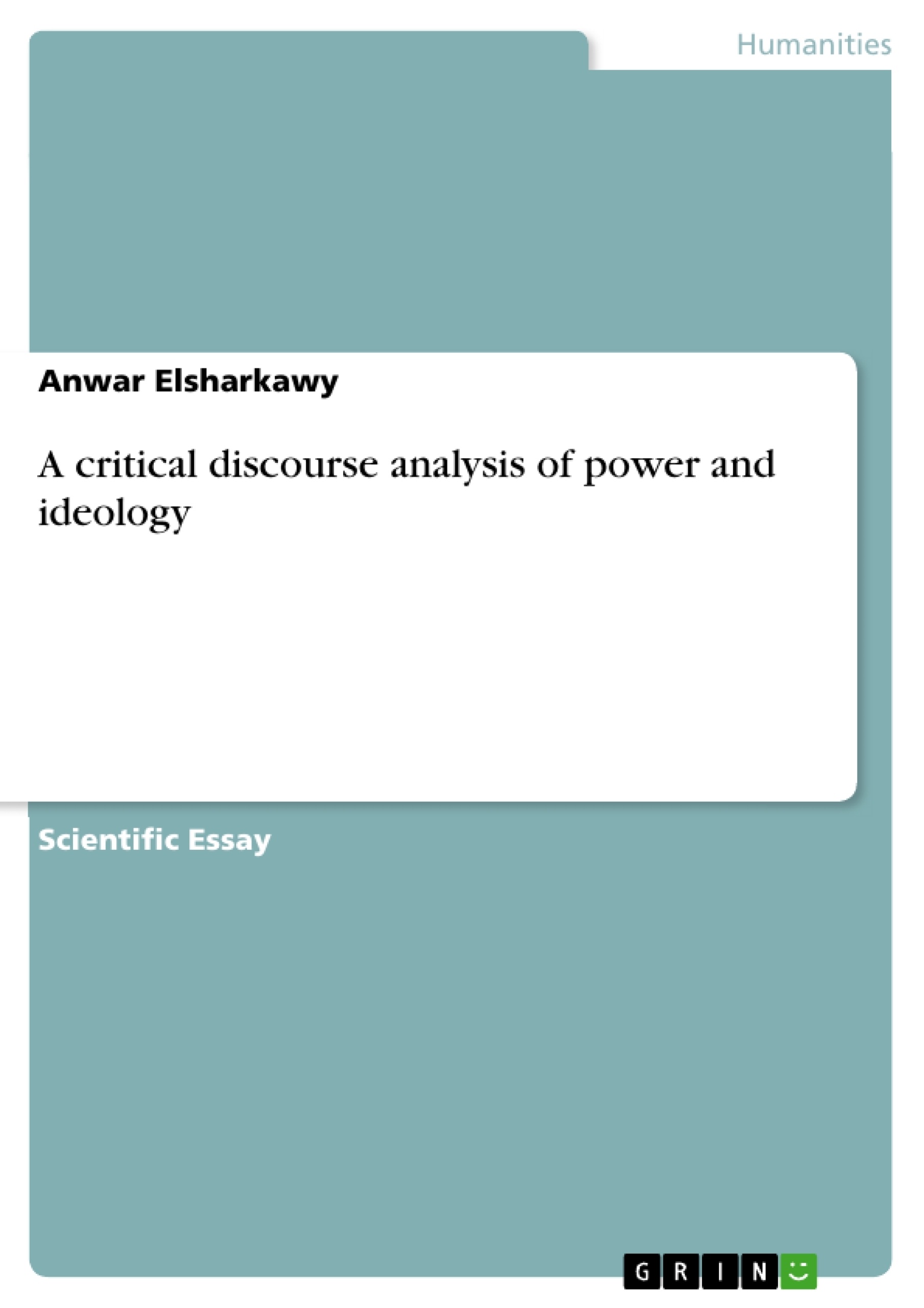This paper has shown the relations of critical discourse analysis (CDA) to Power and Ideology, trying to present the most common theories of power, by which the term power can be defined.
Though it is difficult to find an agreed definition of power because its concept is essentially contested, all approaches are true and there are general understandings among them: first the operation of power is the ability to get an individual to behave or not to behave in a particular manner and the ability to achieve one's goals while denying others access to the same.
Second, modern power is persuasive and manipulative rather than coercive (i.e., using of force), or incentive, such as the explicit issuing of commands, orders, threats or economic sanctions. Third, Power can be ideological, commonsensical, or symbolic, and within these confines, it can operate at a range of different levels: the social, individual, military, state-based, legal, and so on. Fourth, although the process of power may be realized in different ways and in different social environments, the resources of power utilized may not be of the same type. Fifth, some individuals or groups may access or use strategic resources to maintain a position and a status of power over others.
Table of Contents
- Introduction
- Theories and Definitions of Power
- Theories of power
- Definitions of Power
- Power and CDA
- Ideological Power
- Commonsensical Power
- Symbolic Power
- Power and other approaches
- Power and Conversational Analysis
- Power and pragmatics
- The Exercise of Power
- Domination
Objectives and Key Themes
This paper aims to explore the relationship between Critical Discourse Analysis (CDA), power, and ideology. It seeks to provide a definition of power within the framework of CDA, highlighting its multifaceted nature and its manifestation in language. The paper examines various theories of power, drawing from diverse fields like sociology, psychology, and philosophy.
- The multifaceted nature of power and its definitions.
- The relationship between language and power within the CDA framework.
- Different theoretical perspectives on power, including those of Marx, Adler, Nietzsche, Machiavelli, and Hobbes.
- The role of ideology in shaping and reinforcing power structures.
- The ways in which power is exercised and manifested in social interactions.
Chapter Summaries
Introduction: This chapter introduces the paper's central theme: the intricate relationship between CDA, power, and ideology. It establishes CDA's focus on how language reflects and recreates power dynamics, highlighting its role in enacting discriminatory practices and shaping unequal relations. The chapter emphasizes language's function not merely as a communication tool but as a means of demonstrating commitment to specific ideologies, drawing on Birch's assertion that language is intrinsically linked to action, interaction, power, and control. It also introduces the concept of symbolic power and its exercise through representational practices, differentiating it from physical, coercive power.
Theories and Definitions of Power: This section delves into diverse perspectives on power, starting with foundational thinkers like Marx, Adler, and Nietzsche. It then shifts to contemporary theorists whose work is central to understanding CDA's approach to power. The chapter lays the groundwork for understanding the diverse conceptualizations of power, setting the stage for later discussions of its manifestation in discourse.
Theories of power: This chapter examines historical traditions in the study of power, contrasting Machiavelli's strategic and decentralized view with Hobbes's emphasis on state sovereignty and the social contract. It further explores post-World War II analyses, particularly the elite theory of power exemplified by Charles Wright Mills' work on the "power elite." The chapter highlights the historical evolution of power theories and their implications for understanding power structures in modern society.
Keywords
CDA, Power, Ideology, Domination, Dominance, Commonsense, Naturalization
Frequently Asked Questions: A Comprehensive Language Preview
What is the main focus of this language preview?
This preview offers a comprehensive overview of a text exploring the relationship between Critical Discourse Analysis (CDA), power, and ideology. It details the text's objectives, key themes, chapter summaries, and keywords.
What are the key themes explored in the text?
The text examines the multifaceted nature of power, its definitions within the CDA framework, and the relationship between language and power. It explores diverse theoretical perspectives on power from various thinkers (Marx, Adler, Nietzsche, Machiavelli, Hobbes) and the role of ideology in shaping power structures. The text also delves into how power is exercised and manifested in social interactions.
What topics are covered in the different chapters?
The Introduction sets the stage, defining CDA's focus on language's role in reflecting and recreating power dynamics. The chapter on Theories and Definitions of Power explores various perspectives on power, from foundational thinkers to contemporary theorists relevant to CDA. The chapter on Theories of power examines historical traditions in the study of power, contrasting different views and highlighting the evolution of power theories. Additional chapters explore the exercise of power and the concept of domination.
What is the significance of Critical Discourse Analysis (CDA) in this text?
CDA provides the analytical framework for understanding how power operates through language. The text uses CDA to examine how language reflects and reinforces power dynamics, discriminatory practices, and unequal relations. It highlights language's role not just as communication but as a tool for expressing and enforcing ideologies.
What theoretical perspectives on power are discussed?
The text draws on diverse theoretical perspectives on power, including those of Marx, Adler, Nietzsche, Machiavelli, and Hobbes. It also incorporates contemporary theories crucial to understanding CDA's approach to power.
What are the key concepts and keywords related to this text?
Key terms include CDA, Power, Ideology, Domination, Dominance, Commonsense, and Naturalization.
What is the overall aim of the text?
The text aims to explore and define power within the framework of CDA, highlighting its multifaceted nature and its manifestation in language. It seeks to understand the intricate relationship between CDA, power, and ideology.
- Quote paper
- Anwar Elsharkawy (Author), 2011, A critical discourse analysis of power and ideology, Munich, GRIN Verlag, https://www.grin.com/document/350636




